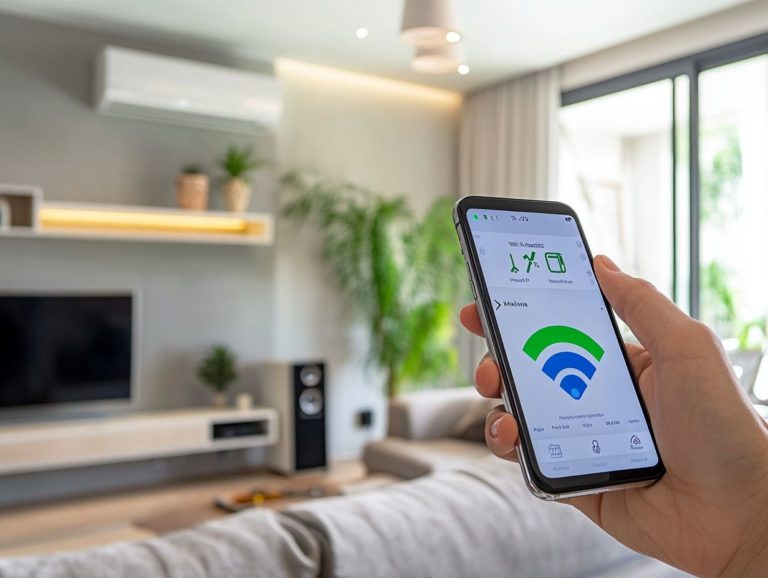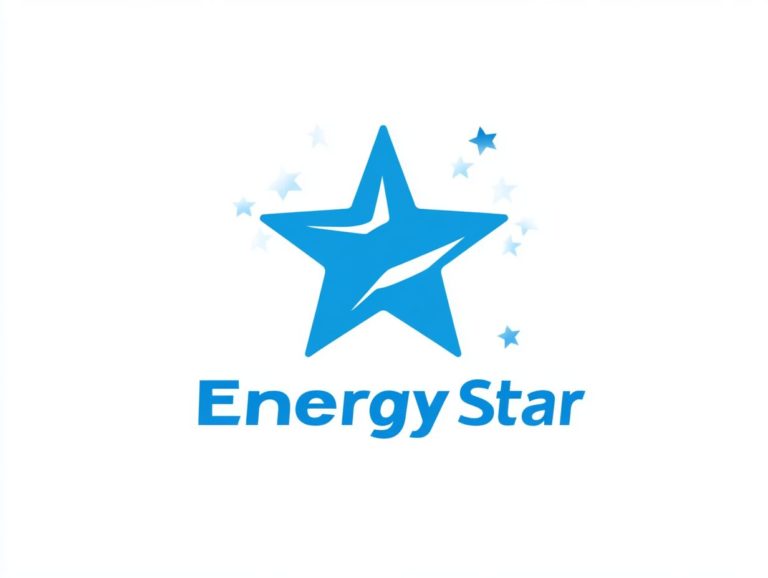What are the Pros and Cons of Energy Audits?
Energy audits offer a comprehensive assessment of your home or business’s energy consumption. They uncover potential avenues for enhanced efficiency and savings.
While the benefits can be substantial, it s crucial to consider these advantages alongside any potential limitations.
This article delves into the specifics of what an energy audit involves, outlining both the pros and cons, along with key factors you should contemplate before booking one. This article also explores alternatives for boosting energy efficiency, equipping you with the insights necessary to make an informed decision.
Contents
Key Takeaways:

Understanding Energy Audits
Understanding energy audits is crucial for you, whether you’re a homeowner or a business owner. They offer valuable insights into your energy consumption, potential savings, and essential upgrades to boost energy efficiency.
An energy audit entails a detailed assessment of your property, performed by a professional auditor. They use special tools like infrared cameras and blower door tests (tests that measure air tightness) to identify air leaks, evaluate insulation, and analyze your HVAC system (heating, ventilation, and air conditioning system).
This thorough analysis not only uncovers inefficiencies but also guides you toward energy-efficient upgrades. These upgrades can significantly lower your utility bills and enhance your property’s overall value. It’s a vital step on your journey to sustainable living.
What is an Energy Audit?
An energy audit is a thorough assessment of your home or business’s energy consumption, designed to pinpoint inefficiencies and suggest thoughtful improvements.
This process typically entails a meticulous examination of various systems, including heating, ventilation, air conditioning, lighting, and insulation. By analyzing how energy flows through your space, professionals can identify specific areas ripe for upgrades.
A successful audit not only reveals where energy is squandered but also provides actionable insights that pave the way for energy-efficient enhancements.
Such upgrades can dramatically reduce your electricity costs while also contributing to a smaller carbon footprint, fostering a healthier environment. Ultimately, by embracing these recommendations, you can experience enhanced comfort and savings while making a meaningful positive impact on our planet.
The Pros of Energy Audits
The benefits of energy audits go far beyond merely spotting inefficiencies. They present you with substantial financial savings, enhanced comfort, and increased energy efficiency for both your home and business.
By identifying where energy is being squandered, energy audits empower you to plan strategic upgrades that can significantly reduce your electric costs and, in turn, lower your utility bills.
As the push for sustainable practices intensifies among individuals and companies alike, the relevance of energy audits grows. This highlights the importance of energy conservation and eco-friendly solutions in today s world.
Ready to unlock savings? Take the first step towards energy efficiency today!
Benefits for Homeowners

Homeowners can gain many benefits from a thorough energy audit, including lower utility bills, increased home value, and the chance to implement energy-efficient upgrades that enhance comfort and health.
By identifying air leaks and thermal inefficiencies, these audits can highlight areas for improvement, ensuring your heating and cooling systems (HVAC) operate at their best. They also provide tailored recommendations for upgraded HVAC systems and appliances, such as those certified by Energy Star, which boost energy savings.
Local utility companies may offer enticing rebates for efficiency upgrades, providing additional financial incentive.
This approach can help you save big and often enhances indoor air quality, transforming your living spaces into healthier and more enjoyable environments.
Benefits for Businesses
Your business stands to gain immensely from energy audits, as these assessments unveil opportunities to boost energy efficiency and cut operational costs.
Through comprehensive evaluations, you can gain valuable insights into your energy consumption patterns, pinpointing areas of excessive usage or waste. For example, an audit might reveal that your outdated lighting systems are using more energy than modern LED alternatives. This points to a straightforward upgrade that could lead to substantial savings.
Implementing smart thermostats can optimize heating and cooling by adjusting settings based on occupancy. These changes enhance your bottom line and create a more comfortable and productive workplace environment, allowing your employees to thrive in well-lit and climate-controlled spaces.
The Cons of Energy Audits
Energy audits offer many advantages but also come with some limitations and drawbacks that you should evaluate before moving forward.
Potential Limitations and Drawbacks
Limitations tied to energy audits can include the cost of hiring a professional, potential inefficiencies in the audit process, and challenges when implementing recommended upgrades.
You might encounter variability in auditor competency, leading to inconsistent results and uncertainty about the reliability of their recommendations. Not every auditor has the same depth of knowledge about specific systems or technologies, which can impact the quality of the audit you receive.
Some upgrades may require complex retrofitting or new technology, demanding an investment that not everyone is prepared to make. These money concerns can feel overwhelming, leading many to reconsider the practicality of an energy audit, even when the long-term benefits could be substantial.
Factors to Consider Before Getting an Energy Audit

Before you embark on an energy audit, it’s crucial to evaluate key factors such as costs, time commitment, and the specific needs the audit intends to address. Doing so will ensure that you maximize the benefits and insights gained from the process.
Costs and Time Commitment
Understanding the costs and time commitment associated with an energy audit is essential for your financial planning and budgeting.
By familiarizing yourself with the various expenses tied to these audits, you can better prepare for both immediate and long-term financial implications. Professional fees for an energy audit typically range from a few hundred to several thousand dollars, depending on the complexity of your property and the experience of the auditor. Additionally, be aware that there may be costs related to implementing the recommended upgrades, which will vary based on the energy efficiency measures suggested. To get started, consider reading up on how to conduct a home energy audit.
The duration for completing the audit generally spans a few hours to a couple of days, while the actual implementation of improvements can take weeks or even months, depending on the extent of the work required.
Assessing the Need for an Energy Audit
Assessing the need for an energy audit means taking a close look at your current energy consumption patterns to determine if any existing issues call for a professional evaluation.
Start by reviewing your utility bills for any unexpected spikes or consistently high charges; these can signal areas ripe for energy efficiency improvements. Pay attention to your usage during peak times versus off-peak periods to spot any anomalies. If you notice drafty windows or inconsistent temperatures between rooms, or if you have an old heating and cooling system, these could indicate that a thorough review might be in your best interest.
However, if the issues seem minor, you might find that simple DIY solutions like sealing gaps, swapping out light bulbs for energy-efficient options, or adjusting your thermostat settings can enhance efficiency without requiring expert intervention.
Alternatives to Energy Audits
While energy audits offer invaluable insights into energy efficiency, you have a variety of alternatives at your fingertips to enhance your energy performance.
Other Ways to Improve Energy Efficiency

You don t have to rely solely on a formal energy audit to enhance energy efficiency. Consider making upgrades, opting for Energy Star appliances (appliances that meet energy efficiency guidelines set by the U.S. Environmental Protection Agency), and tackling common culprits like insulation and air leaks.
Start by ensuring your insulation is up to par in critical areas like attics and walls. This simple step can lead to substantial savings on heating and cooling costs. Next, focus on weather-stripping and caulking around doors and windows. This can effectively seal air leaks, keeping those pesky drafts at bay and minimizing energy waste.
Upgrading to programmable thermostats is another savvy move; it allows you to control temperatures more efficiently, optimizing your energy usage. Regular maintenance of HVAC systems keeps them running smoothly, while switching to LED lighting can significantly reduce your electricity bills.
These small yet impactful changes can play a vital role in fostering a more sustainable environment.
Frequently Asked Questions
What are the pros of energy audits?
- Identify energy-saving opportunities: Energy audits can help identify areas in a building where energy can be saved, leading to cost savings in the long run.
- Increase energy efficiency: By pinpointing specific areas of improvement, energy audits can help make a building more energy-efficient, resulting in lower utility bills.
- Environmental benefits: Reducing energy consumption also means reducing carbon emissions, making energy audits a step towards a more sustainable future.
What are the cons of energy audits?
- Initial cost: Energy audits can be expensive and may require a significant investment upfront, especially for larger buildings.
- Time-consuming: Conducting a thorough energy audit can be a time-consuming process, involving detailed inspections and data collection.
- Disruption of daily operations: In some cases, energy audits may require equipment to be turned off for testing, which could disrupt regular business operations.






